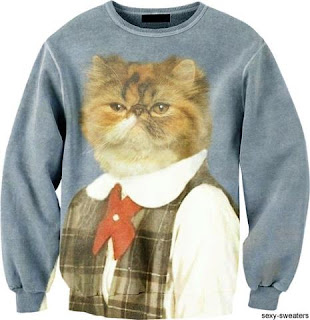Just when I thought it was all over, Dr Redman asked us to conclude our blog with an overview of what we have learnt during our semester in JOUR1111...crud. Well I guess there was a broad set of material we covered during this 14 weeks and majority of it was relatively beneficial and rather enjoyable (though I won't deny I found blogging about cats more entertaining).
This semester really encouraged me to get out in the world, though not as a Journalist. Journalism was never my thing, it was just something I wanted to have a go at, hence why I studied it under Arts. In saying that I still found this an interesting course and enjoyed almost every bit. So I guess the easiest way to do this final post would be to take one point from the twelve lectures we had and make a top 12.
> Lecture One: "I became a journalist to come as close as possible to the heart of the world." - Henry R. Luce
> Lecture Two: The three webs and how "web 3.0" is likely to take over the world (though I think it already has)
> Lecture Three: It is only necessary to read the first paragraph of an article, that is where all the important information is.
> Lecture Four: Pictures tell just as much news as articles, especially with technology in the 21st century
> Lecture Five: Radio news is not dead! It is still one of the leading forms of communicating news and a great pass time while driving. Also, Richard Fidler is hilarious.
> Lecture Six: Commercial Media is just plain overwhelming, there is just too many competitors and so much going on at once!
> Lecture Seven: Public Media is the way to go. It is honest and true, made by the people for the people. Can't beat some good old ABC.
> Lecture Eight: There are only three categories of ethics in relation to media. EVER. (deontonology, consequentialism and virtue ethics.)
> Lecture Nine: "If it BLEEDS, it LEADS" or "If it's LOCAL, it LEADS."
> Lecture Ten: Agenda Setting is complicated and there is defiantly more than one thing learnt in that information filled lecture.
> Lecture Eleven: "An investigative journalist is … to discover the truth and to identify lapses from it in whatever media may be available." - Hugo de Burgh (British Media Theorist)
> Lecture Twelve: The more you blog the better you become at blogging, it is a news revolution. Oh and Steve Molkington is genius.
Looking back at all my lectures I can't believe how much we covered and how much I actually learned. I feel as though I'm more up to date with the way news is presented to society however I still will be one that would rather pick up a news paper then go online to see the latest happenings. Thanks Dr Redman and Caramel for a great semester!!



